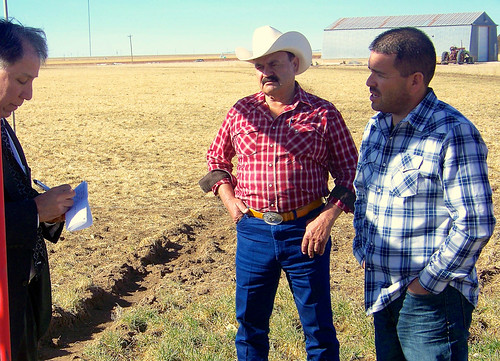
Under Secretary Ed Avalos (left) listens to Carlos and Greg Chavez explain the ongoing effects of drought on farms in Texas. Greg, a next generation farmer, has worked to increase the sustainability and success of his family farm by implementing new technology and irrigation methods that decrease water consumption.
Not everyone goes to work every day knowing that they will be inspired by the people they meet—I’m very fortunate in that way. From the federal agencies that I oversee to the farmers and ranchers I visit with, I am truly inspired by their dedication to serving the American people and their commitment to the success of rural America. And many of the issues that they work on or face in their daily lives are the same issues that we are all concerned with—sustainability and conservation, short-term and long-term stability, and making sure our children and the next generation have paths to success.
During a recent visit to the Texas Panhandle, I stopped to have breakfast and visit with the father and son team who run the Chavez family farm. Carlos and Greg Chavez farm 3,600 acres of corn, wheat and cotton, and run 1,200 head of cattle on winter wheat. Greg, the son, has focused his attention on implementing new crop watering techniques, leveraging technology and conservation practices to combat the inherent dryness brought on by the strong Panhandle winds.
Working with USDA’s Natural Resources Conservation Service (NRCS) on this effort, Greg’s changes involve using a low nozzle-to-ground-height ratio to water his crops. By reducing the distance the water falls, less evaporation occurs. This means more water reaches the soil. In an area that had single-digit inches of rainfall in both 2011 and 2012, finding more efficient ways to get better results and better crops—while using less water—is vital to the long-term success of the family farm. As a next-generation farmer, Greg is constantly looking to new methods and new technology to boost the efficiency and sustainability of the farm.
Across USDA, our agencies and programs are also focused on projects that help support the next generation of rural Americans. Through the Specialty Crop Block Grants (SCBG) program administered by USDA’s Agricultural Marketing Service (AMS), we are helping encourage young and new farmers to apply technology and expand the variety of crops grown. One SCBG project in Nebraska offered students hands-on classes and workshops that focused on growing and selling fruits and vegetables instead of traditional cash crops. The coursework included business and marketing plans, and resulted in at least 50% of the students planning to pursue further education in agriculture.
Another project—this time in Pennsylvania—supports a partnership between the state Department of Agriculture and AgChoice Farm Credit to help increase the chances of long-term success for young (below age 35) and beginning farmers (those with less than 10 years of experience). Over the next couple of years, they will offer these next-generation farmers scholarships to participate in the AgBiz Masters course. The course is a two-year learning process designed to provide sound business concepts and financial management skills for agricultural businesses. By creating business-aware, fiscally-minded farmers and ranchers, Pennsylvania hopes to increase the number of new farms and cost-savings for existing farms.
These are just a few examples of how I am inspired by all of the hard-working people who are helping ensure the future of American agriculture. At USDA, we will continue to support next generation farmers like Greg Chavez as they look to make their farms and businesses more sustainable. And we will continue to work with states and communities across the country to support the next generation of American farmers and ranchers.
No comments:
Post a Comment